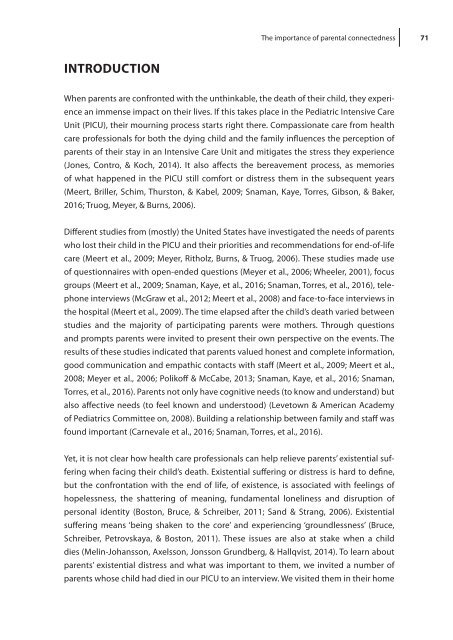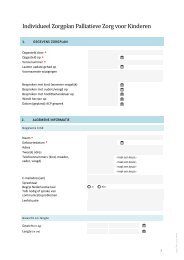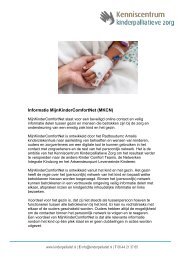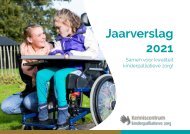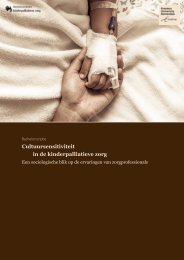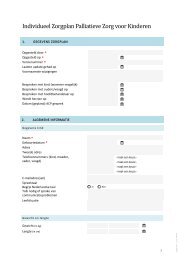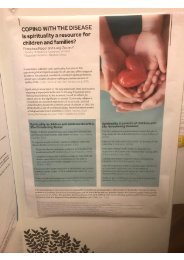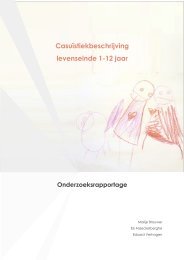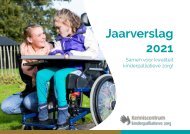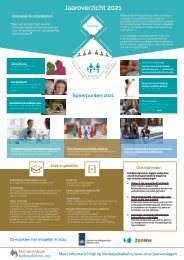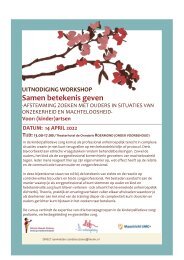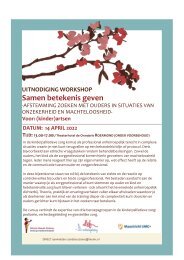Unveiling a fragile spirituality: Experiences of connectedness in pediatric palliative care
You also want an ePaper? Increase the reach of your titles
YUMPU automatically turns print PDFs into web optimized ePapers that Google loves.
The importance <strong>of</strong> parental <strong>connectedness</strong> 71<br />
INTRODUCTION<br />
When parents are confronted with the unth<strong>in</strong>kable, the death <strong>of</strong> their child, they experience<br />
an immense impact on their lives. If this takes place <strong>in</strong> the Pediatric Intensive Care<br />
Unit (PICU), their mourn<strong>in</strong>g process starts right there. Compassionate <strong>care</strong> from health<br />
<strong>care</strong> pr<strong>of</strong>essionals for both the dy<strong>in</strong>g child and the family <strong>in</strong>fluences the perception <strong>of</strong><br />
parents <strong>of</strong> their stay <strong>in</strong> an Intensive Care Unit and mitigates the stress they experience<br />
(Jones, Contro, & Koch, 2014). It also affects the bereavement process, as memories<br />
<strong>of</strong> what happened <strong>in</strong> the PICU still comfort or distress them <strong>in</strong> the subsequent years<br />
(Meert, Briller, Schim, Thurston, & Kabel, 2009; Snaman, Kaye, Torres, Gibson, & Baker,<br />
2016; Truog, Meyer, & Burns, 2006).<br />
Different studies from (mostly) the United States have <strong>in</strong>vestigated the needs <strong>of</strong> parents<br />
who lost their child <strong>in</strong> the PICU and their priorities and recommendations for end-<strong>of</strong>-life<br />
<strong>care</strong> (Meert et al., 2009; Meyer, Ritholz, Burns, & Truog, 2006). These studies made use<br />
<strong>of</strong> questionnaires with open-ended questions (Meyer et al., 2006; Wheeler, 2001), focus<br />
groups (Meert et al., 2009; Snaman, Kaye, et al., 2016; Snaman, Torres, et al., 2016), telephone<br />
<strong>in</strong>terviews (McGraw et al., 2012; Meert et al., 2008) and face-to-face <strong>in</strong>terviews <strong>in</strong><br />
the hospital (Meert et al., 2009). The time elapsed after the child’s death varied between<br />
studies and the majority <strong>of</strong> participat<strong>in</strong>g parents were mothers. Through questions<br />
and prompts parents were <strong>in</strong>vited to present their own perspective on the events. The<br />
results <strong>of</strong> these studies <strong>in</strong>dicated that parents valued honest and complete <strong>in</strong>formation,<br />
good communication and empathic contacts with staff (Meert et al., 2009; Meert et al.,<br />
2008; Meyer et al., 2006; Polik<strong>of</strong>f & McCabe, 2013; Snaman, Kaye, et al., 2016; Snaman,<br />
Torres, et al., 2016). Parents not only have cognitive needs (to know and understand) but<br />
also affective needs (to feel known and understood) (Levetown & American Academy<br />
<strong>of</strong> Pediatrics Committee on, 2008). Build<strong>in</strong>g a relationship between family and staff was<br />
found important (Carnevale et al., 2016; Snaman, Torres, et al., 2016).<br />
Yet, it is not clear how health <strong>care</strong> pr<strong>of</strong>essionals can help relieve parents’ existential suffer<strong>in</strong>g<br />
when fac<strong>in</strong>g their child’s death. Existential suffer<strong>in</strong>g or distress is hard to def<strong>in</strong>e,<br />
but the confrontation with the end <strong>of</strong> life, <strong>of</strong> existence, is associated with feel<strong>in</strong>gs <strong>of</strong><br />
hopelessness, the shatter<strong>in</strong>g <strong>of</strong> mean<strong>in</strong>g, fundamental lonel<strong>in</strong>ess and disruption <strong>of</strong><br />
personal identity (Boston, Bruce, & Schreiber, 2011; Sand & Strang, 2006). Existential<br />
suffer<strong>in</strong>g means ‘be<strong>in</strong>g shaken to the core’ and experienc<strong>in</strong>g ‘groundlessness’ (Bruce,<br />
Schreiber, Petrovskaya, & Boston, 2011). These issues are also at stake when a child<br />
dies (Mel<strong>in</strong>-Johansson, Axelsson, Jonsson Grundberg, & Hallqvist, 2014). To learn about<br />
parents’ existential distress and what was important to them, we <strong>in</strong>vited a number <strong>of</strong><br />
parents whose child had died <strong>in</strong> our PICU to an <strong>in</strong>terview. We visited them <strong>in</strong> their home


